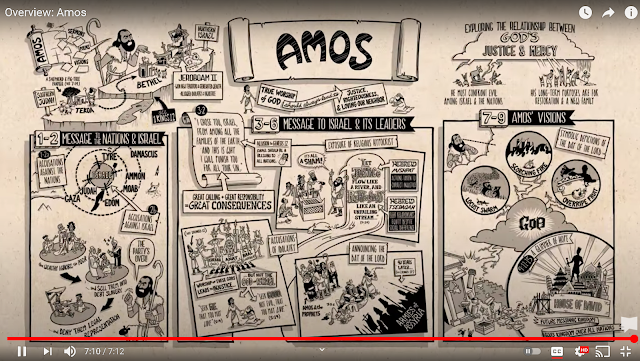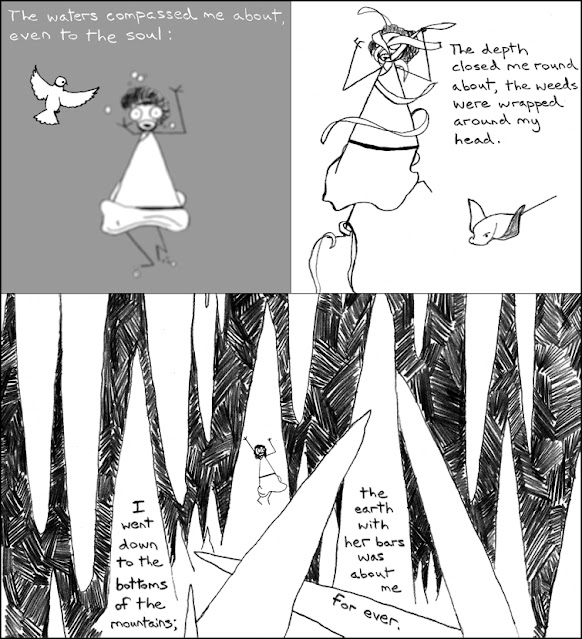Six Nations and Their Rebellion
The book begins with eight oracles against the nations. Bullock points out that the audience is always Israel, not the other nations, even though it begins with them.
"God cared for the other nations even though they cared little for Him. God's expression of concern by pronouncing judgment (or salvation as in Isaiah 19:19-22 ) was intended to remind Israel of her mission to share God with others. At least, these words reminded the hearers of God's international, even universal, power and expectations." -Holman Bible Dictionary
In the earlier period, priests were more often sought out to receive a word from God. Later, the prophets were more prominent. Of course, for a long period both functioned as intermediaries.
This series of judgements is likened to a noose tightening around Israel's throat, or a progressive bullseye of judgement with Israel as the center dot. The point is that God's judgement was certain and Israel's judgement was at the core of the offense.
The beginning of Amos focuses upon the sins of six neighboring nations:
Damascus, Gaza, Tyre, Edom, Ammon, and Moab. Amos lists the culminating sin for each nation, the proverbial straw that broke the camel's back. Even though their relationship with God was different than Israel's, they were still accountable to God with regard to basic decency and His revelation in creation.
Damascus (Capital of Aram)
act of rebellion: threshed Gilead into pulp with iron teeth, ruthless. Gilead was a general term for the Israelite territories east of the Jordan River.
consequence: setting Hazael's palace on fire, burning forts
Gaza & Tyre
act of rebellion: sold people in slavery to the Edomites that were "brothers"
consequence: burning down walls and forts
Edom
act of rebellion: ruthlessness in murder, unrestrained anger
consequence: burning of city and destruction
Ammon
act of rebellion: ripping open pregnant women to instill fear and gain territory
consequence: burning down walls and forts, king goes into exile
Moab
act of rebellion: violated corpse of Edom's king
consequence: burning down city, kill king and princes
Judah
act of rebellion: rejected His revelation, refused to keep His commands
consequence: burning Jerusalem and forts
Israel
act of rebellion: selling people, treating them poorly, as objects for $, temple prostitutes, extortion from poor so they can sit around drinking wine
this despite God delivering them from the Ammonites and Egypt before that
Chapters 3 through 6
Chapter 3 continues to outline God's justification and response, They contain five oracles as identified in Bullock:
1st oracle: Amos 3:1-15 All of Israel
2nd oracle: Amos 4:1-13 Women of Samaria
3rd oracle: Amos 5:1-17 The House of Israel
4th oracle: Amos 5:18-27 Impenitent Israel
5th oracle: Amos 6:1-14 Political Leaders of Judea and Samaria
Chapter 4 focuses on the acts of rebellion of Samarian women, including a love of ease and false worship and sacrifice. God also details that He sent drought, crop failure, disease, and earthquakes, but despite these natural manifestations of His power and judgement, they still ignored Him.
The entire Chapter 5 of Amos contains a lament against Israel formed in two chiastic structures. The heart of these is that God is sovereign and that he longs for individual repentance, not corporate false worship. He longs for people to "Hate evil and love good, then work it out in the public square." -Amos 5:15 MSG
This section convicts me personally and creates a desire for me to attach ourselves, my husband, my family, to acts of righteousness and justice, to bypass the local church which feels like ineffectual dead weight. I am not judge nor jury, but I believe God wants us to be active and attached to our faith, not going through motions that fail to serve Him in the most effectual and highest ways. I believe the local church can be a false idol in this regard--it can make us think we are worshipping but really just serving our own egos/desire for security and community as we prefer it. It can be a self-affirming echo chamber instead of a force for justice. I'm drawn to less corporate manifestations, as they can be false in ancient Israel and false today. I'm drawn to individual repentance and individual relationships with God, then banding together for loving action. The rest comes with that I suspect (the relationship and the community).
"I can't stand your religious meetings. I'm fed up with your conferences and conventions.
I want nothing to do with your religion projects, your pretentious slogans and goals.
I'm sick of your fund-raising schemes, your public relations and image making.
I've had all I can take of your noisy ego-music. When was the last time you sang to me?
Do you know what I want? I want justice—oceans of it. I want fairness—rivers of it.
That's what I want. That's all I want.
Didn't you, dear family of Israel, worship me faithfully for forty years in the wilderness, bringing the sacrifices and offerings I commanded?" Amos 5:21-25
Chapter 6 again reflects back upon the pride and selfish indulgence of the Israelites. Their goal is to be immersed in entertainment, food, wine, ease, and luxury. They're warned of the coming destruction and consequence of their indifference to the things of God.
The Five Visions of Amos
Chapter 7 begins the visions of Amos. BKC points out that God is referred to as "the sovereign Lord" throughout this section whereas previously He was referenced as "the Lord God Almighty."
1st Vision: the locusts--they came just as the first crop went to the king and the second crop was beginning to sprout. Amos pleaded to God after the locusts ate all of the green that Israel was too small to survive it. Matthew Henry views the first crop being spared as evidence of God's mercy, but the Bible Knowledge Commentary views the people as the most dependent and vulnerable at this time of the growing season because this second crop would sustain them. God relents (v 3).
2nd Vision: a fire storm to punish Israel. A fire so intense that it destroys the depths of the sea and the land. Amos pleads and again, God relents.
3rd Vision: The Lord is standing beside a wall with a plumb line. He asks Amos what he sees and says that this time he will not spare Israel. The priest at Bethel, Amaziah, sends message to Jeroboam warning him that Amos is destroying Israel from within and must be silenced. Amaziah confronts Amos and tells him to leave the land, take his mess to Judah. Amos replies that he never asked to be a prophet, was minding his own business when called. But, the Lord called him, and that the punishment will fall on Amaziah in the following ways: his wife will be a prostitute, his children will fall by the sword, your land will be divided up, you will die in an unclean land, and Israel will go into exile.
4th Vision, Chapter 8: A bowl of fresh fruit. BKC: Ripe time” (qēṣ) was “end time” or “cutting time” the “reaping time” of death.
The Results (Amo_8:4-14)
These two results of God’s judgment - human grief and divine silence - are described more fully in Amo_8:4-14.
In this chapter, the sins of corrupt business practices are described--inferior products, dishonest scales, making a dollar over worship, etc.
Amos paints a stark picture of judgement-- God's judgement going forth like an oath, the earth trembling and rising as His judgement is carried out. Other physical manifestations of this judgement: the sun going down at noon. people mourning, comparing this to the loss of one's only son by murder.
There will be a famine of the word of God--divine silence. People will wander in all directions looking for it, but not find it. This reminds me of our current culture--people seeking truth and seeking You but never finding it. There is great travel and globalization but not greater wisdom or honoring of You among the nations. You seem largely silent.
On judgement day, even the youthful and strong will be made weak and those who worship false gods will fall and not rise again. The people who mourned will die as well.
5th Vision, Chapter 9: The Lord standing beside the altar of the false temple. He commands that the top of the pillars be hit so that the floor will shake and all within destroyed. He will hunt them down to all ends of the earth, no escape. God touches the earth and it melts, trembles. Israel is not better than Cush or other nations, only God's hand has made the difference. He has His eye on it all, and He will destroy sin though not entirely wiping out Jacob.
"Yes indeed, it won't be long now." GOD's Decree. "Things are going to happen so fast your head will swim, one thing fast on the heels of the other. You won't be able to keep up. Everything will be happening at once—and everywhere you look, blessings! Blessings like wine pouring off the mountains and hills. I'll make everything right again for my people Israel: "They'll rebuild their ruined cities. They'll plant vineyards and drink good wine. They'll work their gardens and eat fresh vegetables. And I'll plant them, plant them on their own land. They'll never again be uprooted from the land I've given them." GOD, your God, says so."
I cherish God's promise of eating the fruit one has planted in one's own garden. This is peace in the simplest terms--reaping what you've invested in, return on investment.












